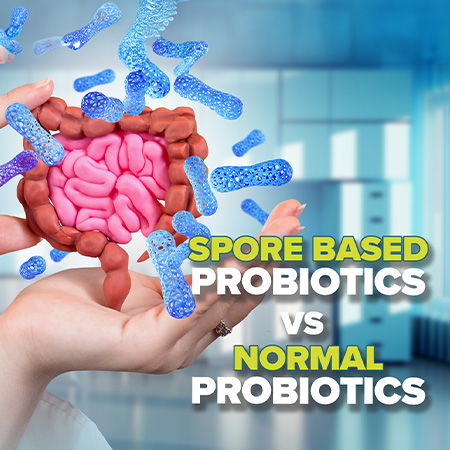Spore-Based Probiotics vs Normal Probiotics: What’s the Difference and Why Does it Matter?
In the vast world of gut health, you come across a ton of different information thrown at you on how to keep your gut in check. We, at Atrantil, promote prebiotics for digestive health. Most of the time, you hear about probiotics and the millions of yogurt companies that want to be your dealer. With all the sugary goodness, loud color choices, and cute mascots, it’s hard to know what to choose. You want healthy, you want tasty, and quite frankly, the cuter the packaging, the better it looks in your and your kids’ lunchboxes. But what if we told you that the probiotics you’re trying to supplement into your diet aren’t really getting into your system? What if we told you that not all probiotics are created equally? Unfortunately, that’s exactly what we are telling you. 
Problems with Normal Probiotics
The most common forms of probiotics that you’ll come across are of the Lactobacillus and Bifidobacterium families. These probiotics are fantastic at their jobs and they really do promote good gut health, but the likelihood of you getting the best quality and right amount of them is very unlikely. Research shows the numerous benefits these bacteria can provide to your body.
However, they aren’t likely to make it to where they need to go because your gastrointestinal tract (GIT) is an inhospitable environment for them. The acids in your stomach will typically kill them before they ever reach their preferred destination.
While certain species can still have a benefit to your body while they are dead, it may not happen for all bacteria, and they may not reap quite as strong benefits. Spore-based organism (SBO) probiotics or soil-based organism probiotics are now being studied as an alternative and potentially better option to our normal probiotic choices.
The Basics of SBO Probiotics
SBO probiotics are a special breed of bacteria that have evolved to survive the entire ride through your digestive tract.
Stomach acids and bile are what typically kill probiotics before they can be useful to your body.
SBO probiotics are different because they contain an endospore.
Endospores are extremely helpful in allowing your body to get the most out of your probiotics.
Endospores are a protective case that allows the bacteria to travel safely to your large intestines.
The spore allows the bacteria to remain dormant until it is needed.
When the bacteria arrives in an environment that seems hospitable, the spore will then release the bacteria.
Spore-Based Bacteria Species
When it comes to probiotics, we typically hear the names of Lactobacillus and Bifidobacteria. These aren’t the same bacteria that you get with the SBO type.
What’s especially interesting about the SBO types of bacteria is that some within the same family can be good while others can be very bad.
Below we have listed some of the more common SBO probiotics you may come across.
We will also mention particular bacteria of those families that you may have heard of as being pathogenic instead of helpful.
Bacillus
Although Lactobacillus does have Bacillus in its name, these two species are not even close to the same.
Bacillus bacteria are spore-formers which means that they are hardier.
Where Lactobacillus is heat-sensitive, Bacillus is capable of withstanding the heat and getting where they need to go to get the job done.
The more commonly studied Bacillus groups as probiotics include:
- Bacillus clausii — reduces acute childhood diarrhea, reduces cytokines in allergic patients, reduces allergies in children, normalized hydrogen breath tests in SIBO patients
- Bacillus subtilis — reduces intestinal epithelial damage, reduces cytokine levels.
- Bacillus coagulans — improves dysbiosis, enhances prebiotics, decreases gas and bloating, anti-inflammatory, improves protein absorption, reduce bowel movements in IBS-D
One study on a combination of Bacillus strains were able to improve leaky gut syndrome by reducing endotoxins and triglycerides.
For patients with IBS and SIBO, it was found that a Bacillus probiotic mixture was just as effective for patients as using rifaximin and the low-FODMAP diet.
The commonly known pathogenic forms of this family include:
- Bacillus cereus
- Bacillus anthracis
Clostridium butyricum
This species has been found to help with many different health problems with little to no side effects. Some of the main ways this probiotic can be beneficial include:
- Suppressing colitis
- Preventing E coli proliferation
- Helping maintain vaginal bacteria homeostasis
- Fighting intestinal anaphylaxis related to food allergies
Although there are many benefits to taking SBO probiotics, just as with normal probiotics, we suggest always consulting your doctor before adding any new probiotics to your daily routine to make sure it is the best course of action for you and your body.
Do you have experience with spore-based probiotics?
If so, let us know your experiences in the comments below!
Resources:
- https://www.ncbi.nlm.nih.gov/pubmed/19390478
- https://academic.oup.com/femsre/article/29/4/813/493366#90536156
- https://www.ncbi.nlm.nih.gov/pubmed/31367461
- https://www.ncbi.nlm.nih.gov/pubmed/15916013
- https://www.ncbi.nlm.nih.gov/pubmed/15059191
- https://www.ncbi.nlm.nih.gov/pmc/articles/PMC4311309/
- https://www.ncbi.nlm.nih.gov/pubmed/26720180
- https://www.ncbi.nlm.nih.gov/pmc/articles/PMC6208742/
- https://www.ncbi.nlm.nih.gov/pubmed/19332970
- https://www.ncbi.nlm.nih.gov/pubmed/20140275
- https://www.wjgnet.com/2150-5330/full/v8/i3/117.htm
- https://www.mdpi.com/2072-6643/11/9/1968/htm
- https://www.ncbi.nlm.nih.gov/pmc/articles/PMC5554123/#__sec9title
- https://www.ncbi.nlm.nih.gov/pubmed/23768495
- https://www.ncbi.nlm.nih.gov/pubmed/31102489
- https://www.ncbi.nlm.nih.gov/pubmed/28250847
- https://www.ncbi.nlm.nih.gov/pmc/articles/PMC3714544/#__sec5title